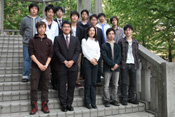Takako Greve, Professor, Faculty of Economics
Do not say that you don’t understand. Use your brain to come up with your own theory.
This is a small seminar class with about 6 to 10 students per year, and we study microeconomics and game theory. I think that game theory offers valuable lessons in life as it requires considering the interest not only of oneself but also of others in order to draw conclusions.

My research mostly involves fundamental issues of game theory, so I cannot work on that with undergraduate students. Instead, I teach students that theories that are in “text books” are not always perfect. Even as a student, if you think a little deeply, you can find loopholes. While students can only take in normal lectures in a passive stance, in the seminar class, they are allowed to question even what is written on the textbook, such as “Why is this?” and “Are there other cases?”.
Also in my seminar class, there is a rule that “you must not say you don’t understand”. Because of cramming for entrance exams, many students unconsciously skip an issue in a textbook if they don’t understand it at the first glance. However, you cannot survive in the real world with such an attitude. Whether it is about life or studies, you must understand things step by step in order to move forward. Rather than stop thinking because “you don’t understand immediately”, I encourage students to make one’s own interpretation anyway, and then correct or improve it with the help from others. We repeat this process over the two years.
For fourth-year students, I make them come up with their own questions and think about the structure of the problem, not just following theories written by others. This leads to their graduation theses. The theme itself can be anything, and looking at the graduation theses of the past, the good ones were of students who chose a theme that interested themselves, and coming up with the cause and effect on their own, such as why pachinko parlors located in front of the station and suburbs have different strategies to attract customers, and whether horse racing is gambling or entertainment.
Career paths of graduates are varied (not related to the theme of the graduation thesis), such as working for financial institutions, manufacturers, trading companies and IT companies, entering government service, and becoming a certified public accountant. As a teacher, I try to give students thorough training to think theoretically, but graduates come to thank me for improving their presentation skills and mental strength to overcome stress interviews.
Student's Voice
Ikuo Kitabata, Fourth-year Student,
Faculty of Economics
Serious battle
In Prof. Greve’s seminar class, we proceed with our main focus on giving presentations based on English literature of game theory and microeconomics. The class usually has a free and vigorous atmosphere, but if there is an unclear point in the presentation, you will be showered with sharp questions from Prof. Greve, so you cannot cut corners in preparation. Every summer we have a study camp, and this year we went to Kawaguchiko. At the camp, fourth-year students give interim presentations of their graduation theses, and third-year students hold a debate. There are different types of fourth-year students, as some write outstanding papers that are so much different from the beginning, and others get into their favorite hobbies. As for the third-year students, the defeated group in the debate has to prepare for the tennis we play afterwards, so it is a serious battle. In such a cheerful atmosphere, we pursue real academics for the first time in our lives under the strict but warm mentorship of Prof. Greve.
*Position titles, etc., are those at the time of publishing.
